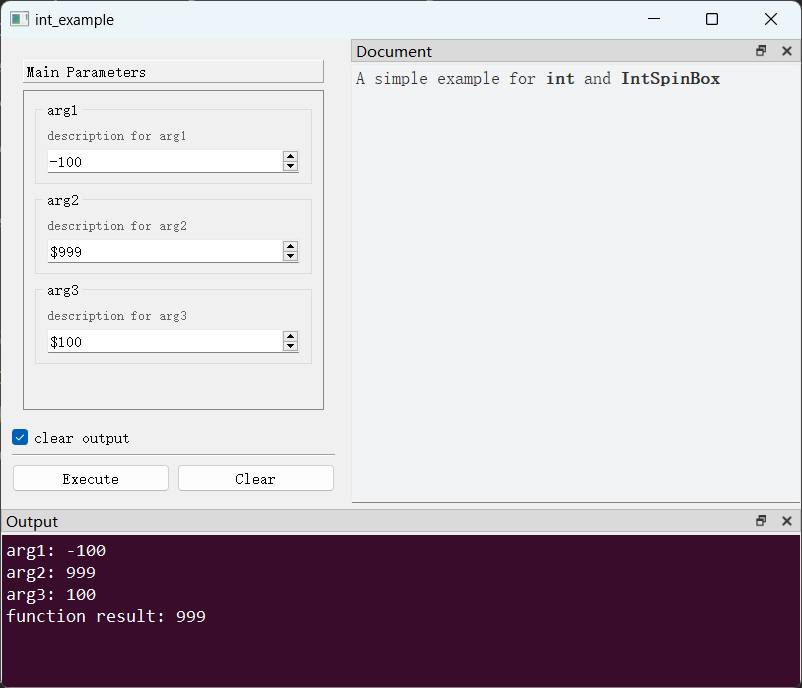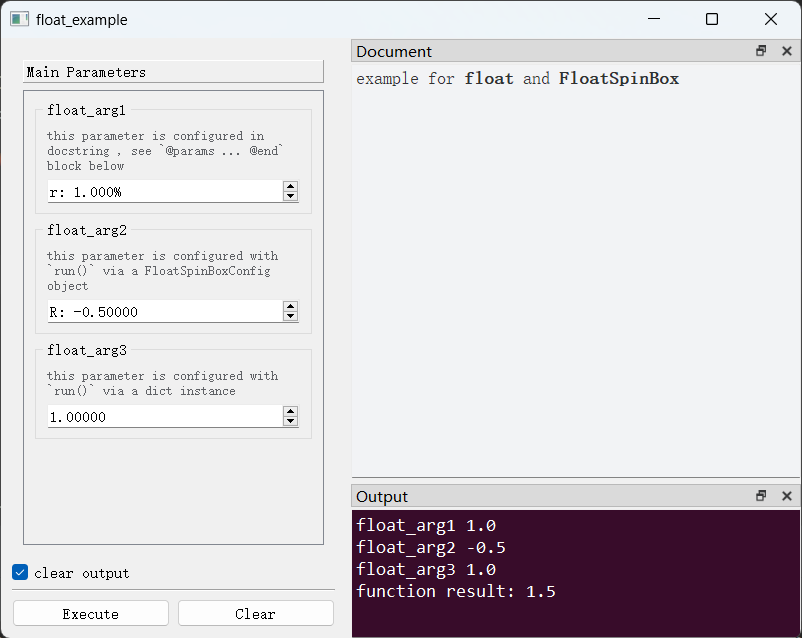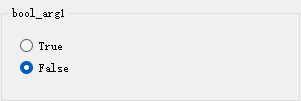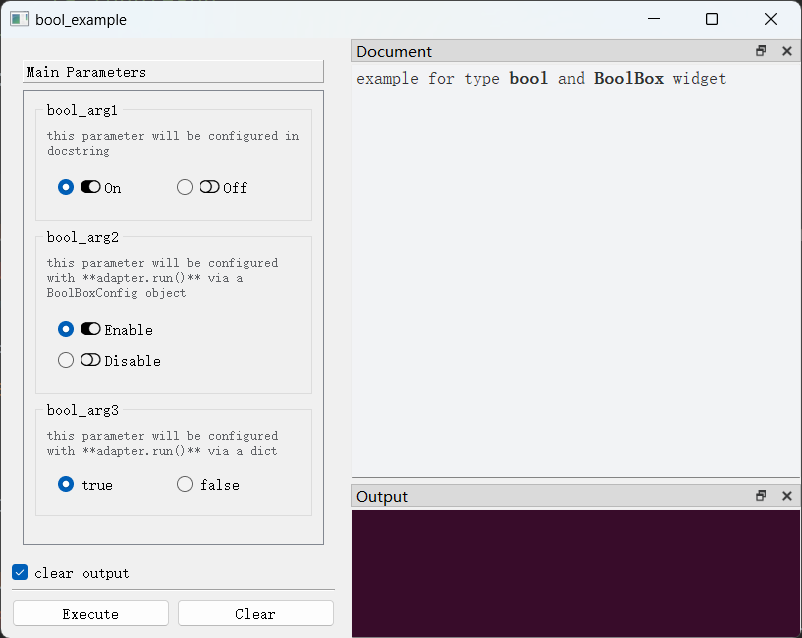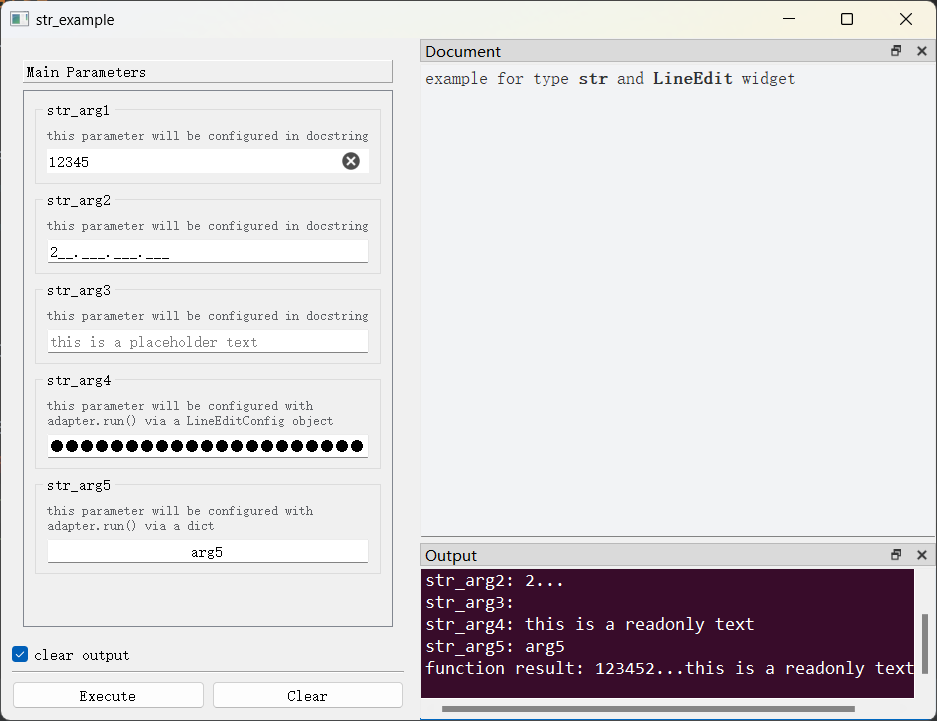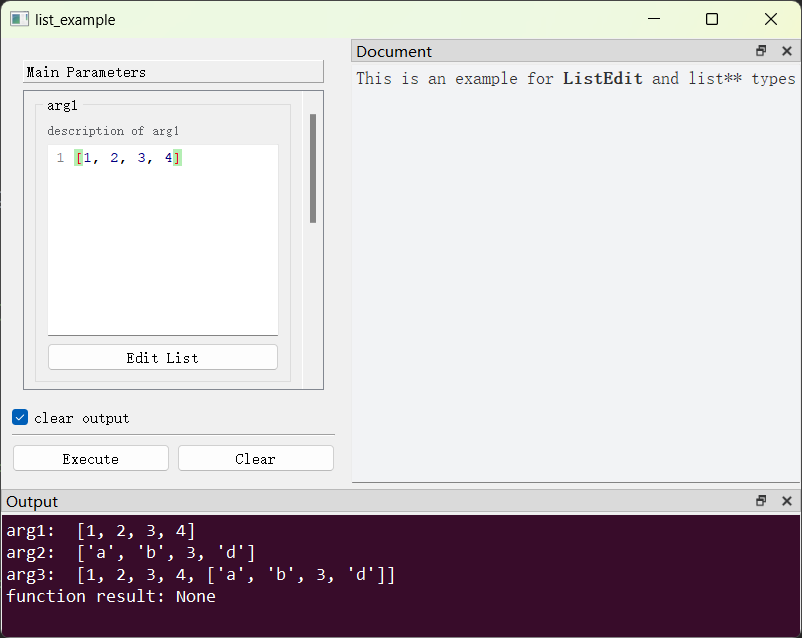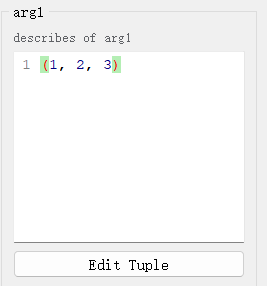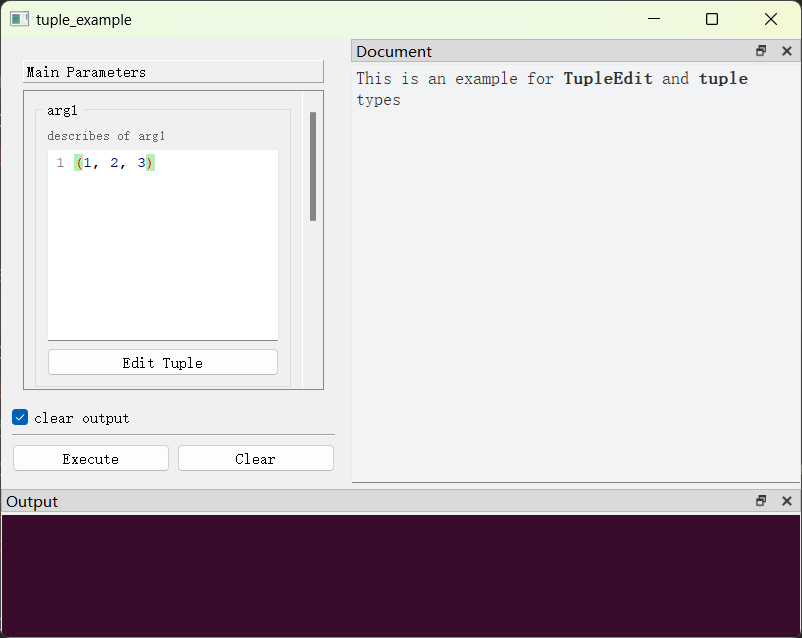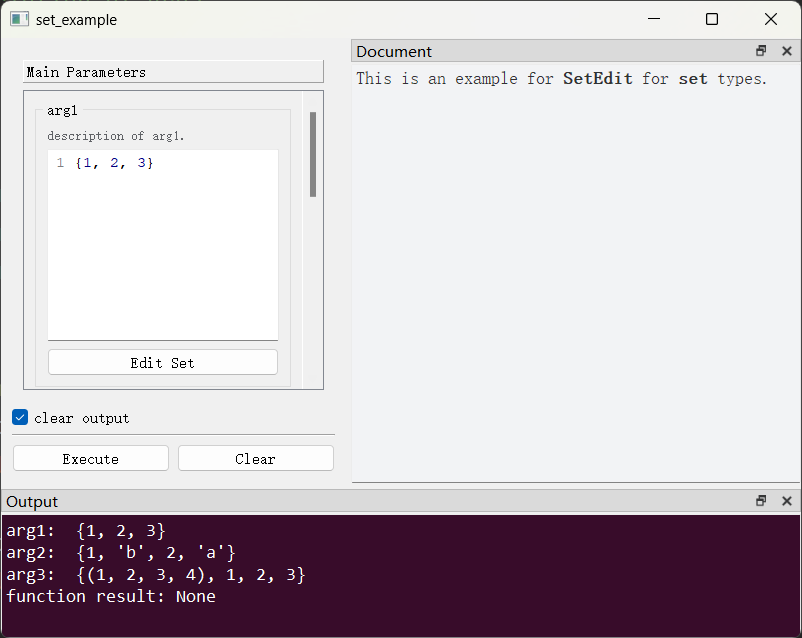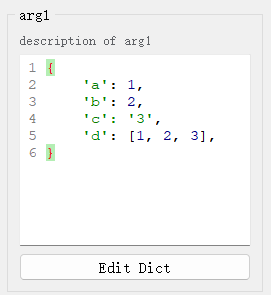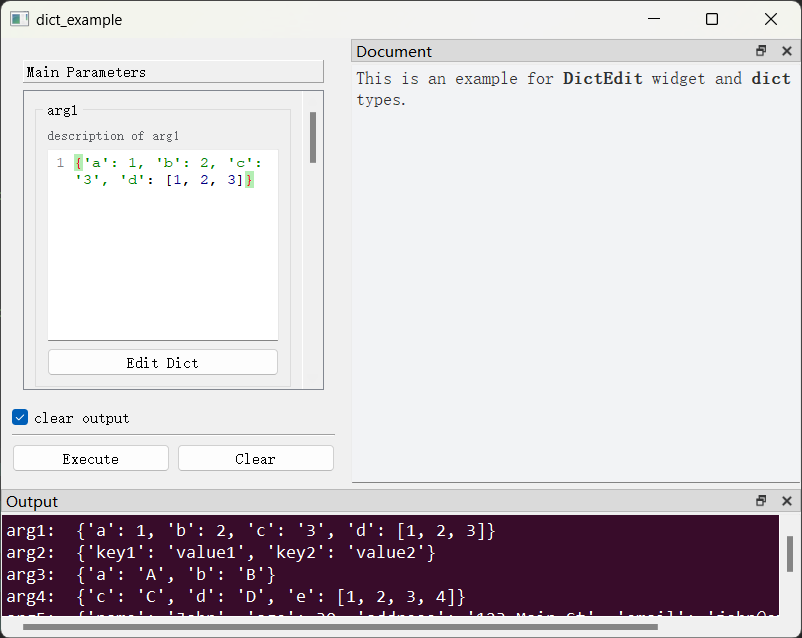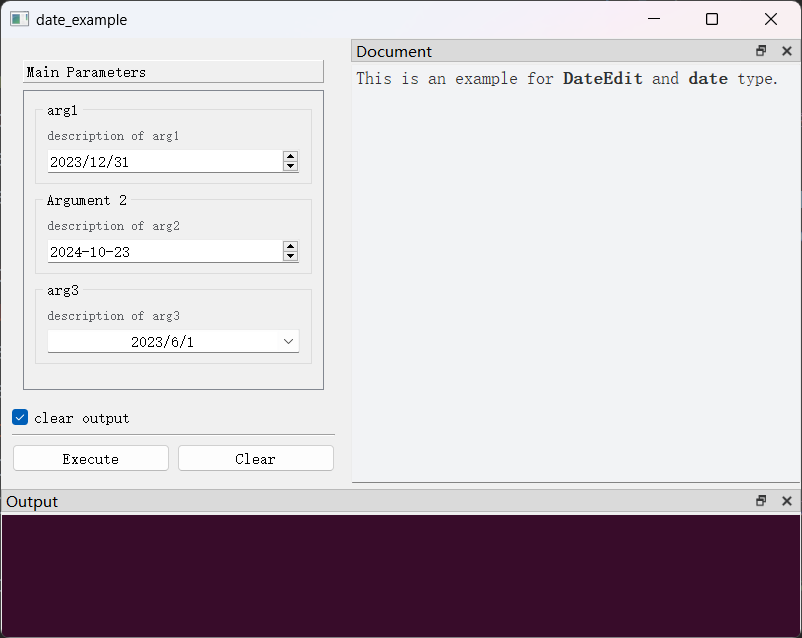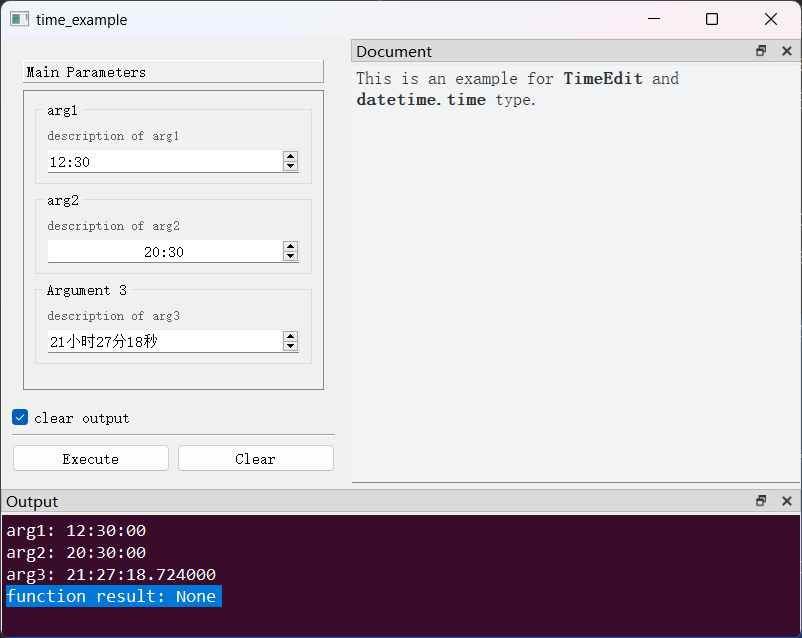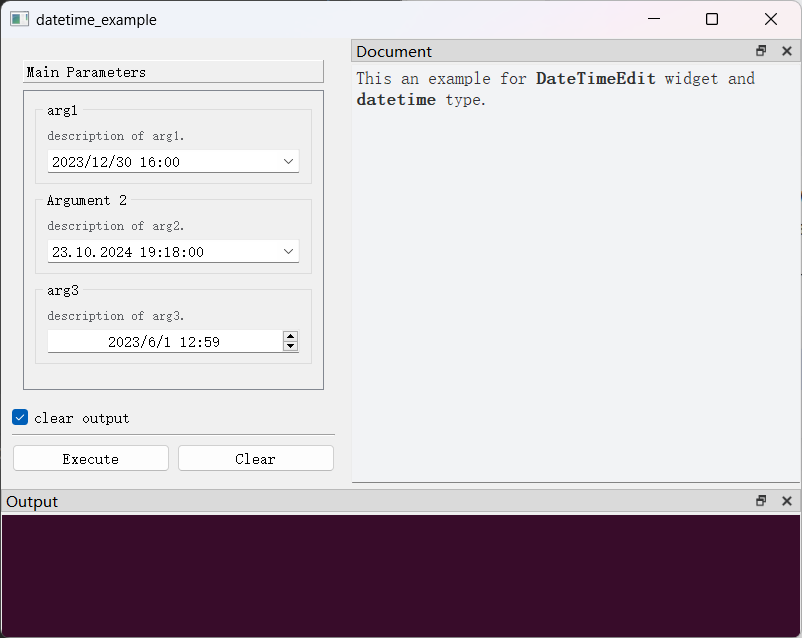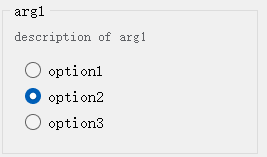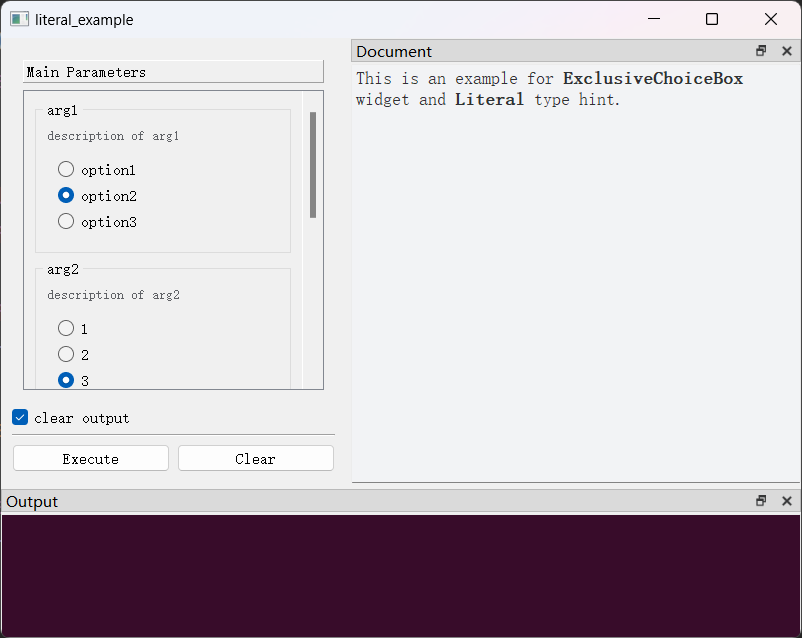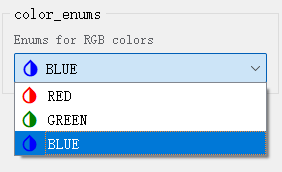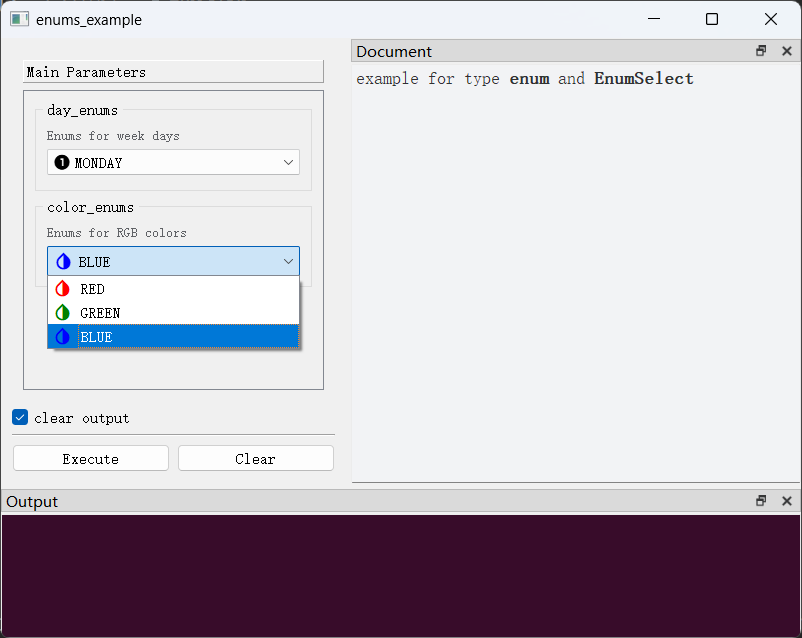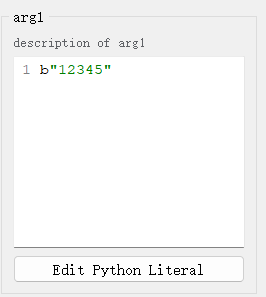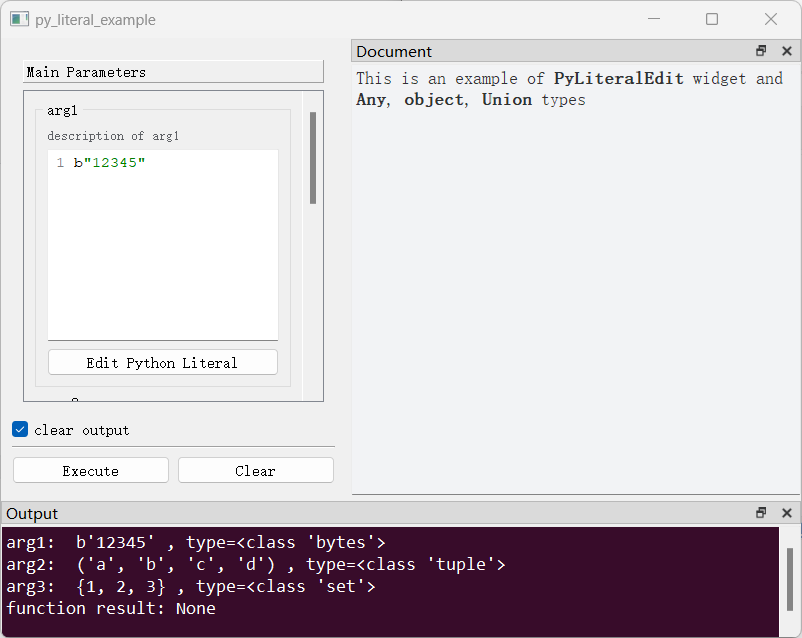基础类型与控件
(一)int类型
1、默认控件
IntSpinBox- 外观
2、可配置属性
参见配置类:IntSpinBoxConfig
3、示例
from pyguiadapter.adapter import GUIAdapter
from pyguiadapter.adapter.uoutput import uprint
from pyguiadapter.widgets import IntSpinBoxConfig
def int_example(arg1: int, arg2: int, arg3: int = 100) -> int:
"""
A simple example for **int** and **IntSpinBox**
@param arg1: description for arg1
@param arg2: description for arg2
@param arg3: description for arg3
@return:
@params
# parameter widget config for arg1
[arg1]
default_value = -100
min_value = -100
max_value = 100
# parameter widget config for arg2
[arg2]
default_value = 1000
max_value = 999
prefix = "$"
@end
"""
uprint("arg1:", arg1)
uprint("arg2:", arg2)
uprint("arg3:", arg3)
return arg1 + arg2 + arg3
if __name__ == "__main__":
adapter = GUIAdapter()
adapter.add(
int_example,
widget_configs={
# parameter config for arg3
"arg3": IntSpinBoxConfig(
default_value=100, min_value=0, max_value=1000, step=10, prefix="$"
)
},
)
adapter.run()
(二)float类型
1、默认控件
FloatSpinBox- 外观
2、可配置属性
参见配置类:FloatSpinBoxConfig
3、示例
from pyguiadapter.adapter import GUIAdapter
from pyguiadapter.adapter.uoutput import uprint
from pyguiadapter.widgets import FloatSpinBoxConfig
def float_example(float_arg1: float, float_arg2: float, float_arg3: float = 3.14):
"""
example for **float** and **FloatSpinBox**
@param float_arg1: this parameter is configured in docstring , see `@params ... @end` block below
@param float_arg2: this parameter is configured with `run()` via a FloatSpinBoxConfig object
@param float_arg3: this parameter is configured with `run()` via a dict instance
@return:
@params
[float_arg1]
default_value = 1.0
max_value = 100.0
step = 2.0
decimals = 3
prefix = "r: "
suffix = "%"
@end
"""
uprint("float_arg1", float_arg1)
uprint("float_arg2", float_arg2)
uprint("float_arg3", float_arg3)
return float_arg1 + float_arg2 + float_arg3
if __name__ == "__main__":
adapter = GUIAdapter()
float_arg2_config = FloatSpinBoxConfig(
default_value=-0.5, max_value=1.0, step=0.000005, decimals=5, prefix="R: "
)
adapter.add(
float_example,
widget_configs={
"float_arg2": float_arg2_config,
"float_arg3": {
# this will override the default_value in the function signature
"default_value": 1,
"max_value": 2.0,
"step": 0.00001,
"decimals": 5,
},
},
)
adapter.run()
(三)bool类型
1、默认控件
BoolBox- 外观
2、可配置属性
参见配置类:BoolBoxConfig
3、示例
from pyguiadapter.adapter import GUIAdapter
from pyguiadapter.adapter.uoutput import uprint
from pyguiadapter.widgets import BoolBoxConfig
def bool_example(
bool_arg1: bool = False, bool_arg2: bool = True, bool_arg3: bool = False
):
"""
example for type **bool** and **BoolBox** widget
@param bool_arg1: this parameter will be configured in docstring
@param bool_arg2: this parameter will be configured with **adapter.run()** via a BoolBoxConfig object
@param bool_arg3: this parameter will be configured with **adapter.run()** via a dict
@return:
@params
[bool_arg1]
# this will override the default value defined in the function signature
default_value = true
true_text = "On"
false_text = "Off"
true_icon = "fa.toggle-on"
false_icon = "fa.toggle-off"
vertical = false
@end
"""
uprint(bool_arg1, bool_arg2, bool_arg3)
return bool_arg1, bool_arg2, bool_arg3
if __name__ == "__main__":
bool_arg2_conf = {
# this will override the default value defined in the function signature
"default_value": True,
"true_text": "Enable",
"false_text": "Disable",
"true_icon": "fa.toggle-on",
"false_icon": "fa.toggle-off",
"vertical": True,
}
bool_arg3_conf = BoolBoxConfig(
# this will override the default value defined in the function signature
default_value=True,
true_text="true",
false_text="false",
vertical=False,
)
adapter = GUIAdapter()
adapter.add(
bool_example,
widget_configs={"bool_arg2": bool_arg2_conf, "bool_arg3": bool_arg3_conf},
)
adapter.run()
(四)str类型
1、默认控件
LineEdit- 外观
2、可配置属性
参见配置类:LineEditConfig
3、示例
from pyguiadapter.adapter import GUIAdapter
from pyguiadapter.adapter.uoutput import uprint
from pyguiadapter.widgets import LineEditConfig, LineEdit
def str_example(
str_arg1: str = "arg1",
str_arg2: str = "arg2",
str_arg3: str = "arg3",
str_arg4: str = "arg4",
str_arg5: str = "arg5",
):
"""
example for type **str** and **LineEdit** widget
@param str_arg1: this parameter will be configured in docstring
@param str_arg2: this parameter will be configured in docstring
@param str_arg3: this parameter will be configured in docstring
@param str_arg4: this parameter will be configured with adapter.run() via a LineEditConfig object
@param str_arg5: this parameter will be configured with adapter.run() via a dict
@return:
@params
[str_arg1]
# override the default value of str_arg1 defined in the function signature
default_value = "123456"
clear_button = true
max_length = 5
frame = false
[str_arg2]
input_mask = "000.000.000.000;_"
[str_arg3]
default_value = ""
placeholder = "this is a placeholder text"
@end
"""
uprint("str_example")
uprint("str_arg1:", str_arg1)
uprint("str_arg2:", str_arg2)
uprint("str_arg3:", str_arg3)
uprint("str_arg4:", str_arg4)
uprint("str_arg5:", str_arg5)
return str_arg1 + str_arg2 + str_arg3 + str_arg4 + str_arg5
if __name__ == "__main__":
str_arg4_conf = LineEditConfig(
# override the default value of str_arg4 defined in the function signature
default_value="this is a readonly text",
readonly=False,
echo_mode=LineEdit.PasswordEchoOnEditMode,
)
str_arg5_conf = {
"validator": r"^[a-zA-Z0-9]+$",
"alignment": LineEdit.AlignCenter,
}
adapter = GUIAdapter()
adapter.add(
str_example,
widget_configs={
"str_arg4": str_arg4_conf,
"str_arg5": str_arg5_conf,
},
)
adapter.run()
(五)list类型
1、默认控件
ListEdit- 外观
2、可配置属性
参见配置类:ListEditConfig
3、示例
from typing import List
from pyguiadapter.adapter import GUIAdapter
from pyguiadapter.adapter.uoutput import uprint
from pyguiadapter.widgets import ListEditConfig
def list_example(arg1: list, arg2: List, arg3: list):
"""
This is an example for **ListEdit** and list** types
Args:
arg1: description of arg1
arg2: description of arg2
arg3: description of arg3
Returns:
None
@params
[arg1]
default_value = [1,2,3,4]
[arg2]
default_value = ["a", "b", 3, "d"]
@end
"""
uprint("arg1: ", arg1)
uprint("arg2: ", arg2)
uprint("arg3: ", arg3)
if __name__ == "__main__":
arg3_conf = ListEditConfig(
default_value=[1, 2, 3, 4, ["a", "b", 3, "d"]],
# set editor_height or editor_width to 0 will hide the inplace editor
editor_height=0,
editor_width=0,
)
adapter = GUIAdapter()
adapter.add(
list_example,
widget_configs={"arg3": arg3_conf},
)
adapter.run()
(六)tuple类型
1、默认控件
TupleEdit- 外观
2、可配置属性
参见配置类:TupleEditConfig
3、示例
from typing import Tuple
from pyguiadapter.adapter import GUIAdapter
from pyguiadapter.adapter.uoutput import uprint
from pyguiadapter.widgets import TupleEditConfig
def tuple_example(arg1: tuple, arg2: Tuple, arg3: tuple):
"""
This is an example for **TupleEdit** and **tuple** types
Args:
arg1: describes of arg1
arg2: describes of arg2
arg3: describes of arg3
Returns:
None
"""
uprint("arg1: ", arg1)
uprint("arg2: ", arg2)
uprint("arg3: ", arg3)
if __name__ == "__main__":
arg1_conf = TupleEditConfig(
default_value=(1, 2, 3),
)
arg2_conf = {
"default_value": (1, 2, 3, [1, 2, 3, 4]),
}
arg3_conf = TupleEditConfig(
default_value=(1, 2, 3),
label="Arg3",
# set editor_height or editor_width to 0 will hide the inplace editor
editor_height=0,
editor_width=0,
)
adapter = GUIAdapter()
adapter.add(
tuple_example,
widget_configs={
"arg1": arg1_conf,
"arg2": arg2_conf,
"arg3": arg3_conf,
},
)
adapter.run()
(七)set类型
1、默认控件
SetEdit- 外观
2、可配置属性
参见配置类:SetEditConfig
3、示例
from typing import Set, MutableSet
from pyguiadapter.adapter import GUIAdapter
from pyguiadapter.adapter.uoutput import uprint
from pyguiadapter.widgets import SetEditConfig
def set_example(arg1: set, arg2: Set, arg3: MutableSet):
"""
This is an example for **SetEdit** for **set** types.
Args:
arg1: description of arg1.
arg2: description of arg2.
arg3: description of arg3.
Returns:
None.
"""
uprint("arg1: ", arg1)
uprint("arg2: ", arg2)
uprint("arg3: ", arg3)
if __name__ == "__main__":
arg1_conf = SetEditConfig(
default_value={1, 2, 3},
)
arg2_conf = SetEditConfig(
default_value={"a", "b", 1, 2},
)
arg3_conf = {
"default_value": {1, 2, 3, (1, 2, 3, 4)},
}
adapter = GUIAdapter()
adapter.add(
set_example,
widget_configs={
"arg1": arg1_conf,
"arg2": arg2_conf,
"arg3": arg3_conf,
},
)
adapter.run()
(七)dict类型
1、默认控件
DictEdit- 外观
2、可配置属性
参见配置类:DictEditConfig
3、示例
from typing import Dict, Mapping, MutableMapping, TypedDict
from pyguiadapter.adapter import GUIAdapter
from pyguiadapter.adapter.uoutput import uprint
from pyguiadapter.widgets import DictEditConfig
class User(TypedDict):
name: str
age: int
address: str
email: str
def dict_example(
arg1: dict, arg2: Dict, arg3: MutableMapping, arg4: Mapping, arg5: User
):
"""
This is an example for **DictEdit** widget and **dict** types.
Args:
arg1: description of arg1
arg2: description of arg2
arg3: description of arg3
arg4: description of arg4
arg5: description of arg5
Returns:
None
@params
[arg1]
default_value = {a=1,b=2,c="3"}
[arg2]
default_value = {"key1"="value1", "key2"="value2"}
@end
"""
uprint("arg1: ", arg1)
uprint("arg2: ", arg2)
uprint("arg3: ", arg3)
uprint("arg4: ", arg4)
uprint("arg5: ", arg5)
if __name__ == "__main__":
arg1_conf = DictEditConfig(
default_value={"a": 1, "b": 2, "c": "3", "d": [1, 2, 3]},
)
arg3_conf = DictEditConfig(
default_value={"a": "A", "b": "B"},
)
arg4_conf = DictEditConfig(
default_value={"c": "C", "d": "D", "e": [1, 2, 3, 4]},
)
arg5_conf = DictEditConfig(
default_value=User(
name="John", age=30, address="123 Main St", email="john@example.com"
),
)
adapter = GUIAdapter()
adapter.add(
dict_example,
widget_configs={
"arg1": arg1_conf,
"arg3": arg3_conf,
"arg4": arg4_conf,
"arg5": arg5_conf,
},
)
adapter.run()
(八)date类型
1、默认控件
DateEdit- 外观
2、可配置属性
参见配置类:DateEditConfig
3、示例
from datetime import date
from pyguiadapter.adapter import GUIAdapter
from pyguiadapter.adapter.uoutput import uprint
from pyguiadapter.widgets import DateEditConfig, DateEdit
def date_example(arg1: date, arg2: date, arg3: date):
"""
This is an example for **DateEdit** and **date** type.
Args:
arg1: description of arg1
arg2: description of arg2
arg3: description of arg3
Returns:
None
@params
[arg2]
label = "Argument 2"
display_format = "yyyy-MM-dd"
@end
"""
uprint("arg1", arg1)
uprint("arg2", arg2)
uprint("arg3", arg3)
if __name__ == "__main__":
arg1_conf = DateEditConfig(
min_date=date(2023, 1, 1),
max_date=date(2023, 12, 31),
)
arg3_conf = DateEditConfig(
default_value=date(2023, 6, 1),
min_date=date(2023, 1, 1),
max_date=date(2023, 12, 31),
calendar_popup=True,
alignment=DateEdit.AlignCenter,
time_spec=DateEdit.UTC,
)
adapter = GUIAdapter()
adapter.add(
date_example,
widget_configs={"arg1": arg1_conf, "arg3": arg3_conf},
)
adapter.run()
(九)time类型
1、默认控件
TimeEdit- 外观
2、可配置属性
参见配置类:TimeEditConfig
3、示例
from datetime import time
from pyguiadapter.adapter import GUIAdapter
from pyguiadapter.adapter.uoutput import uprint
from pyguiadapter.widgets import TimeEditConfig, TimeEdit
from pyguiadapter.widgets.basic.datetimeedit import TimeSpec
def time_example(arg1: time, arg2: time, arg3: time):
"""
This is an example for **TimeEdit** and **datetime.time** type.
Args:
arg1: description of arg1
arg2: description of arg2
arg3: description of arg3
Returns:
None
@params
[arg3]
label = "Argument 3"
display_format = "HH小时mm分ss秒"
@end
"""
uprint("arg1:", arg1)
uprint("arg2:", arg2)
uprint("arg3:", arg3)
if __name__ == "__main__":
arg1_conf = TimeEditConfig(
default_value=time(hour=12, minute=30),
max_time=time(hour=23, minute=59),
min_time=time(hour=0, minute=0),
time_spec=TimeSpec.UTC,
)
arg2_conf = TimeEditConfig(
default_value=time(hour=20, minute=30),
max_time=time(hour=23, minute=59),
min_time=time(hour=12, minute=0),
alignment=TimeEdit.AlignCenter,
)
adapter = GUIAdapter()
adapter.add(
time_example,
widget_configs={"arg1": arg1_conf, "arg2": arg2_conf},
)
adapter.run()
(十)datetime类型
1、默认控件
DateTimeEdit- 外观
2、可配置属性
参见配置类:DateTimeEditConfig
3、示例
from datetime import datetime
from pyguiadapter.adapter import GUIAdapter
from pyguiadapter.adapter.uoutput import uprint
from pyguiadapter.widgets import DateTimeEditConfig, DateTimeEdit
def datetime_example(arg1: datetime, arg2: datetime, arg3: datetime):
"""
This an example for **DateTimeEdit** widget and **datetime** type.
Args:
arg1: description of arg1.
arg2: description of arg2.
arg3: description of arg3.
Returns:
None.
@params
[arg2]
label = "Argument 2"
display_format = "dd.MM.yyyy HH:mm:ss"
@end
"""
uprint("arg1", arg1)
uprint("arg2", arg2)
uprint("arg3", arg3)
if __name__ == "__main__":
arg1_conf = DateTimeEditConfig(
min_datetime=datetime(2023, 1, 1),
max_datetime=datetime(2023, 12, 31),
time_spec=DateTimeEdit.UTC,
)
arg3_conf = DateTimeEditConfig(
default_value=datetime(2023, 6, 1, 12, 59, 59),
min_datetime=datetime(2023, 1, 1),
max_datetime=datetime(2023, 12, 31),
alignment=DateTimeEdit.AlignCenter,
calendar_popup=False,
)
adapter = GUIAdapter()
adapter.add(
datetime_example,
widget_configs={
"arg1": arg1_conf,
"arg3": arg3_conf,
},
)
adapter.run()
(十一)typing.Literal类型
1、默认控件
2、可配置属性
参见配置类:ExclusiveChoiceBoxConfig
3、示例
from typing import Literal
from pyguiadapter.adapter import GUIAdapter
from pyguiadapter.adapter.uoutput import uprint
from pyguiadapter.widgets import ExclusiveChoiceBoxConfig
class MyObj(object):
def __init__(self, name: str):
self._name = name
def __str__(self):
return self._name
def __eq__(self, other):
if isinstance(other, MyObj):
return other._name == self._name
return False
def __hash__(self):
return hash(self._name)
my_objects = [MyObj("obj1"), MyObj("obj2"), MyObj("obj3")]
def literal_example(
arg1: Literal["option1", "option2", "option3"] = "option2",
arg2: Literal[1, 2, 3, 4, 5] = 3,
arg3: Literal["option1", "option2", 1, 2, True, False] = 1,
arg4: MyObj = my_objects[0],
):
"""
This is an example for **ExclusiveChoiceBox** widget and **Literal** type hint.
Args:
arg1: description of arg1
arg2: description of arg2
arg3: description of arg3
arg4: description of arg4
Returns:
None
@params
[arg3]
columns = 2
show_type_icon = true
@end
"""
uprint("arg1: ", arg1)
uprint("arg2: ", arg2)
uprint("arg3: ", arg3)
uprint(f"arg4: {arg4}({type(arg4)})")
if __name__ == "__main__":
arg4_conf = ExclusiveChoiceBoxConfig(
default_value=my_objects[1],
show_type_icon=True,
choices=my_objects,
object_icon="ei.asl",
)
adapter = GUIAdapter()
adapter.add(literal_example, widget_configs={"arg4": arg4_conf})
adapter.run()
(十二)enum.Enum类型
1、默认控件
EnumSelect- 外观
2、可配置属性
参见配置类:EnumSelectConfig
3、示例
from enum import Enum
from pyguiadapter.adapter import GUIAdapter
from pyguiadapter.adapter.uoutput import uprint
from pyguiadapter.utils import qta_icon
from pyguiadapter.widgets import EnumSelectConfig
class Weekday(Enum):
MONDAY = 1
TUESDAY = 2
WEDNESDAY = 3
THURSDAY = 4
FRIDAY = 5
SATURDAY = 6
SUNDAY = 7
class Color(Enum):
RED = 1
GREEN = 2
BLUE = 3
def enums_example(day_enums: Weekday, color_enums: Color = Color.GREEN):
"""
This is an example for type **enum** and **EnumSelect** widget.
@param day_enums: Enums for week days
@param color_enums: Enums for RGB colors
@return:
@params
[day_enums]
default_value = "MONDAY"
icons = {"MONDAY"="mdi6.numeric-1-circle", "TUESDAY"="mdi6.numeric-2-circle"}
@end
"""
uprint(day_enums)
uprint(color_enums)
if __name__ == "__main__":
color_enums_conf = EnumSelectConfig(
# this will override the default value defined in the function signature
default_value=Color.BLUE,
icons={
# you can use the Enum value as the key to its icon
"RED": qta_icon("mdi.invert-colors", color="red"),
"GREEN": qta_icon("mdi.invert-colors", color="green"),
"BLUE": qta_icon("mdi.invert-colors", color="blue"),
# or you can use the Enum value itself as the key to its icon
# Color.RED: qta_icon("mdi.invert-colors", color="red"),
# Color.GREEN: qta_icon("mdi.invert-colors", color="green"),
# Color.BLUE: qta_icon("mdi.invert-colors", color="blue"),
},
icon_size=(24, 24),
)
adapter = GUIAdapter()
adapter.add(enums_example, widget_configs={"color_enums": color_enums_conf})
adapter.run()
(十三)typing.Any、object类型
1、默认控件
2、可配置属性
参见配置类:PyLiteralEditConfig
3、示例
from typing import Any, Union
from pyguiadapter.adapter import GUIAdapter
from pyguiadapter.adapter.uoutput import uprint
from pyguiadapter.widgets import PyLiteralEditConfig
def py_literal_example(arg1: Any, arg2: object, arg3: Union[int, str]):
"""
This is an example of **PyLiteralEdit** widget and **Any**, **object**, **Union** types
Args:
arg1: description of arg1
arg2: description of arg2
arg3: description of arg3
Returns:
None
"""
uprint("arg1: ", arg1, f", type={type(arg1)}")
uprint("arg2: ", arg2, f", type={type(arg2)}")
uprint("arg3: ", arg3, f", type={type(arg3)}")
if __name__ == "__main__":
# PyLiteralEdit support the PyLiteralType, which is a Union of:
# bool, int, float, bytes, str, list, tuple, dict, set and NoneType.
arg1_config = PyLiteralEditConfig(
default_value=[1, 2, 3, 4],
)
arg2_config = PyLiteralEditConfig(
default_value=("a", "b", "c", "d"),
)
arg3_config = PyLiteralEditConfig(
default_value={1, 2, 3},
)
adapter = GUIAdapter()
adapter.add(
py_literal_example,
widget_configs={
"arg1": arg1_config,
"arg2": arg2_config,
"arg3": arg3_config,
},
)
adapter.run()

